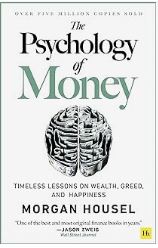 Click on the book to buy on Amazon
Click on the book to buy on Amazon
"The Psychology of Money: Timeless Lessons on Wealth,
Greed, and Happiness" by Morgan Housel explores the complex
relationship between people and money, emphasizing the psychological
and emotional aspects of financial decision-making. The book is
structured around 20 short stories, each illustrating a key lesson
about how people think about and handle money. Here’s a detailed
summary of the core concepts and lessons:
1. No One’s Crazy
People make financial decisions based on their own unique
experiences and perspectives. What seems irrational to one person
may be perfectly logical to another given their background and
experiences.
2. Luck & Risk
Luck and risk are two sides of the same coin. Housel argues that
it's crucial to acknowledge the role of luck in financial success
and to be aware of the risks involved in financial decisions. He
uses the example of Bill Gates to illustrate how fortunate
circumstances can significantly impact success.
3. Never Enough
Understanding when you have "enough" is vital. The pursuit of
more can lead to unnecessary risk and dissatisfaction. Housel
emphasizes the importance of contentment and the dangers of
insatiable greed.
4. Confounding Compounding
Compounding is a powerful force in finance, but its effects are
often underestimated because it grows slowly and accelerates over
time. The story of Warren Buffett highlights how long-term
compounding can lead to extraordinary wealth.
5. Getting Wealthy vs. Staying Wealthy
Building wealth and maintaining wealth require different mindsets
and strategies. While risk-taking and optimism are necessary to
accumulate wealth, humility and the ability to adapt are crucial for
preserving it.
6. Tails, You Win
Outliers, or "tail events," can have a disproportionate impact on
financial outcomes. Understanding that a small number of events
often account for the majority of success can help in making better
financial decisions.
7. Freedom
Money’s greatest value is its ability to give individuals control
over their time and choices. Financial independence provides the
freedom to live life on one's own terms, which Housel argues is the
true definition of wealth.
8. Man in the Car Paradox
People often buy expensive items to impress others, but those
others are usually more focused on their own lives. The paradox is
that people don’t care as much about your possessions as you think
they do.
9. Wealth is What You Don’t See
True wealth is what you don't see—it's the money not spent.
Housel argues that building wealth is about accumulating assets that
aren't immediately visible, such as savings and investments, rather
than spending on conspicuous consumption.
10. Save Money
Saving money is not just about creating a safety net; it's also
about creating options and flexibility. Housel emphasizes the
importance of a high savings rate, which can provide opportunities
and peace of mind.
11. Reasonable > Rational
Being financially successful doesn’t always require making the
most rational decisions; sometimes, it’s about making reasonable
decisions that align with one's personal goals and comfort levels.
12. Surprise!
The financial world is full of surprises and uncertainties.
Housel advises preparing for a wide range of possible outcomes and
maintaining flexibility to adapt to unexpected changes.
13. Room for Error
Building in a margin of safety, or room for error, in financial
plans helps to protect against unforeseen setbacks. This can involve
having extra savings or more conservative investments to ensure
resilience.
14. You’ll Change
People’s goals and desires evolve over time. Housel suggests that
financial planning should be flexible and adaptable to accommodate
changes in personal circumstances and priorities.
15. Nothing’s Free
Everything has a price, and in finance, the price is often
volatility and uncertainty. Accepting this reality and being willing
to pay the price is crucial for long-term investment success.
16. You & Me
Financial advice is often tailored to general audiences, but
individual circumstances vary greatly. Housel stresses the
importance of personalized financial strategies that reflect
individual needs and situations.
17. The Seduction of Pessimism
Negative news often receives more attention than positive news,
but excessive pessimism can be detrimental to financial
decision-making. Housel encourages a balanced perspective and a
focus on long-term optimism.
18. When You’ll Believe Anything
Stories and narratives have a powerful influence on financial
decisions. Recognizing the difference between compelling stories and
factual analysis is key to making sound financial choices.
19. All Together Now
Good financial habits involve a combination of skills, including
frugality, patience, and a focus on long-term goals. Housel
emphasizes the importance of integrating these habits into everyday
life.
20. The Confessions
In the final chapter, Housel reflects on his own financial
decisions and the lessons he has learned, reinforcing the idea that
personal experiences shape our financial behavior and attitudes.
Conclusion:
Morgan Housel’s "The Psychology of Money" provides valuable
insights into the often-overlooked psychological factors that drive
financial behavior. By understanding these factors, readers can make
more informed and effective financial decisions, leading to greater
financial security and independence. The book's blend of
storytelling and practical advice makes complex financial concepts
accessible and relatable, encouraging readers to reflect on their
own financial habits and attitudes.